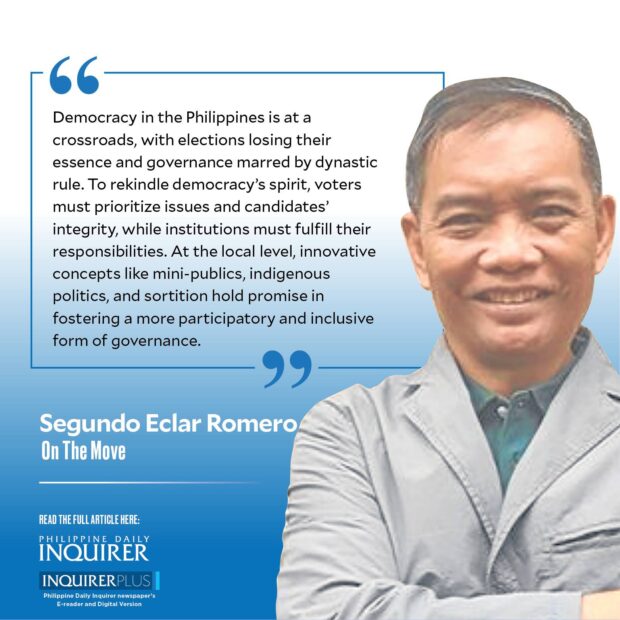Reviving democracy: Pathways for the PH
Elections in the Philippines have lost their luster, becoming distasteful and fraught with challenges. The system is flawed at multiple levels, with voters failing to prioritize crucial issues, electoral processes losing credibility, and dynasties continuing to dominate the political landscape.
Voters must shift their focus from name recognition to the competency and integrity of candidates. Citizens should evaluate candidates based on their commitment to enacting public policies that address their well-being in the short and long term.
The credibility of the electronic voting system has waned as it remains vulnerable to manipulation and corruption. The integrity of the May 2022 elections should be squarely defended with transparency by the Commission on Elections (Comelec), not disingenuous avoidance. Safeguards must be strengthened to preserve the integrity of the electoral process going forward and prevent unscrupulous politicians from hijacking democracy.
The results of elections perpetuate political dynasties, even if their scions have been convicted of crimes. This culture of impunity undermines the very essence of democratic governance. The institutions meant to uphold democratic hygiene, like the Comelec, the Ombudsman, and other commissions, have not fulfilled their roles, leading to a shaky regulatory governance system.
The President, despite being the most influential figure, often falls short of driving substantial change. The State of the Nation Address (Sona) becomes the unreal pinnacle of presidential performance, belying the mainstream reality—a fragmented bureaucratic landscape and action.
To revitalize democracy, attention should be directed toward the local level of governance. Concepts like mini-publics, indigenous politics, and sortition offer fresh perspectives.
Mini-publics, involving citizens’ assemblies, can promote informed decision-making and public participation. Mini-publics are small representative groups of citizens brought together to deliberate on specific political issues. This concept has gained attention as a way to foster public participation and informed decision-making, and to counterbalance the influence of interest groups.
From the time Republic Act No. 7160 or the Local Government Code of 1991 created various local special bodies at various levels of local government, local government officials never really understood how genuine participation comes from facilitative processes by which people and their representatives are enabled and empowered to make decisions on matters on which their welfare depends on the most. Most LGU procedures focus on filtering and registering allies who should be granted participation rights.
Indigenous politics emphasize self-determination, land rights, and cultural preservation. The concept focuses on the struggles and mobilization efforts of indigenous communities worldwide. This concept sheds light on issues of self-determination, land rights, cultural preservation, and political representation.
In the Philippines, indigenous politics has yet to be mainstreamed, and insufficient research and innovation have addressed the way the law provides entitlements to indigenous peoples, only to withhold these by virtue of opaque and unyielding processes that make a mockery of the idea of ancestral domain claims.
Sortition, or random selection, provides an alternative to traditional elections, breaking the grip of political elites and promoting inclusivity. Advocates argue that sortition can address issues of elitism, political corruption, and the exclusion of marginalized voices from decision-making processes. By selecting citizens at random to participate in political decision-making bodies, sortition promotes inclusivity, diversity, and deliberative democracy.
Political dynasties have been the bane of Philippine politics. Sortition offers a potential solution by introducing an element of randomness in the selection of political representatives. Proponents argue that sortition can help break the grip of political elites and provide opportunities for ordinary citizens to participate in decision-making processes. By ensuring a diverse and representative sample of the population, sortition aims to counteract the perpetuation of power within dynastic circles.
To effect change, the focus of rebuilding democracy should shift to local problem-solving within a robust framework like the Sustainable Development Goals. Case studies can shed light on how knowledge is transformed into policies and actions, involving local institutions, senior citizen associations, and youth organizations.
Democracy in the Philippines is at a crossroads, with elections losing their essence and governance marred by dynastic rule. To rekindle democracy’s spirit, voters must prioritize issues and candidates’ integrity, while institutions must fulfill their responsibilities. At the local level, innovative concepts like mini-publics, indigenous politics, and sortition hold promise in fostering a more participatory and inclusive form of governance. It is time to light a candle and embrace change, rather than succumbing to the darkness of a flawed system.
doyromero@gmail.com





















